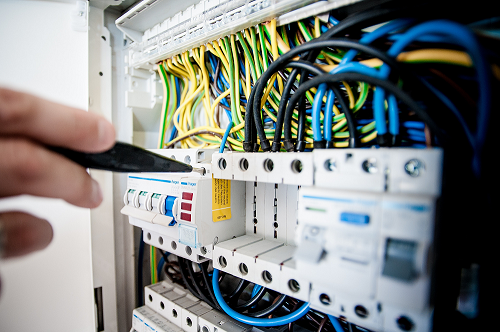The various types of electrical systems in vintage homes were all quite safe when they were installed. Over time, however, it’s possible that your wiring has degraded or been improperly repaired by previous owners.
Fuse boxes are an obsolete type of electrical panel found in homes built in the 1960s or earlier. If you’ve bought a house with electrical fuses, you need a thorough electrical inspection immediately.
Note that your insurance provider might require that you replace the fuse box and make necessary electrical repairs before you’re covered, which can delay the mortgage process.
Are Fuse Boxes Still Safe to Use?

There’s nothing inherently dangerous about fuses. They work much like circuit breaker panels. The big difference is that when a circuit overloads, a blown fuse needs to be replaced whereas a breaker switch flips off and you can simply manually reset it.
Replacement fuses cost a dollar or two; more advanced time-delay fuses allow for short surges before blowing but cost several dollars more.
Recognize the fact that a house with a fuse box has electrical components that are more than half a century old. Wire insulation has decayed. Outlets probably aren’t grounded even if you see three-prong outlets.
The fuse box might be safe and the home inspector might not have raised a stink about it, but it’s unlikely your new home can pass a real electrical inspection according to the National Electrical Code. Since your electrical panel was installed, new code requirements include
- GFCI outlets in all wet or outdoor areas
- AFCI breakers in all living areas
- Grounded three-prong outlets for major appliances
Electrical panel sizing and the number of circuits have also increased since then. Your fuse box might only be rated for 60 amps total. New homes have 100 to 200 amps of electrical service. This is necessary to avoid flickering lights and blown fuses while having enough power for modern appliances.
If You Put Off Upgrading a Fuse Box
Talk to a residential electrician about whether it’s safe to postpone upgrading to a circuit breaker panel. At the very least, he might recommend a few small repairs or safety updates. And you might be surprised at the low cost of replacing fuses with breakers.
Until you replace the fuse box with a circuit breaker:
- Check with your homeowner’s insurance providers to see if you can get coverage
- Ensure you have the right size fuse for each circuit
- Keep replacement fuses on hand in case one blows
- Look for other outdated electrical problems like missing GFCI and AFCI
- Do not over-rely on power strips and extension cords, as an older home’s electrical system is prone to overloading
Most importantly, you don’t want a fuse rated for higher amperage on a lower amperage circuit. If a 15-amp circuit uses a 20-amp fuse, the fuse won’t blow when it should so the wiring might overheat and spark a fire.
Circuit Breaker Panel Upgrades
Switching from fuses to circuit breakers gives you the convenience of easily flipping breakers on and off. But there are more reasons for electrical panel upgrades:
- Make electrical repairs required by insurance companies
- Increase power supply to the home
- Add more circuits for major appliances or additional lighting and outlets
- Inspect for home fire risks and make updates all at once
- Correct amateur electrical repairs made by previous homeowners
Your home’s fuse box has done its service, but it’s probably time for retirement.
Get a free estimate for electrical panel replacement by a licensed electrician—contact us for an appointment in the Sonoma County area.

